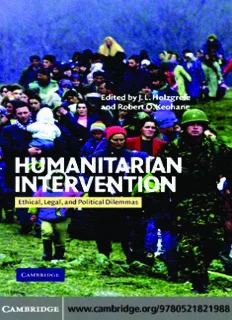
Humanitarian Intervention: Ethical, Legal and Political Dilemmas PDF
Preview Humanitarian Intervention: Ethical, Legal and Political Dilemmas
This page intentionally left blank HUMANITARIAN INTERVENTION Ethical,Legal,andPoliticalDilemmas “The genocide in Rwanda showed us how terrible the consequences of inaction can be in the face of mass murder. But the conflict in Kosovo raisedequallyimportantquestionsabouttheconsequencesofactionwith- outinternationalconsensusandclearlegalauthority.Ontheonehand,isit legitimateforaregionalorganizationtouseforcewithoutaUNmandate? On the other, is it permissible to let gross and systematic violations of human rights, with grave humanitarian consequences, continue un- checked?” (United Nations Secretary-General Kofi Annan, September 1999). This book is a comprehensive, integrated discussion of “the dilemma” of humanitarian intervention. Written by leading analysts of internationalpolitics,ethics,andlaw,itseeks,amongotherthings,toiden- tifystrategiesthatmay,ifnotresolve,atleastreducethecurrenttension betweenhumanrightsandstatesovereignty.Thisvolumeisaninvaluable contributiontothedebateonthisvitalglobalissue. j. l. holzgrefe is a Visiting Research Scholar in the Department of PoliticalScience,DukeUniversity.HeisaformerLecturerinInternational RelationsattheUniversityofSt.Andrews,Scotlandandvisitingscholarat theCenterofInternationalStudies,PrincetonUniversity. robert o. keohane is James B. Duke Professor of Political Science, Duke University. His publications include the award-winning After Hegemony:CooperationandDiscordintheWorldPoliticalEconomy(1984), andPowerandGovernanceinaPartiallyGlobalizedWorld(2002). HUMANITARIAN INTERVENTION Ethical, Legal, and Political Dilemmas Edited by J. L. HOLZGREFE AND ROBERT O. KEOHANE CAMBRIDGEUNIVERSITYPRESS Cambridge, New York, Melbourne, Madrid, Cape Town, Singapore, São Paulo Cambridge University Press The Edinburgh Building, Cambridge CB28RU, UK Published in the United States of America by Cambridge University Press, New York www.cambridge.org Information on this title: www.cambridge.org/9780521821988 © Cambridge University Press 2003 This publication is in copyright. Subject to statutory exception and to the provision of relevant collective licensing agreements, no reproduction of any part may take place without the written permission of Cambridge University Press. First published in print format 2003 ISBN-13 978-0-511-33746-8 eBook (EBL) ISBN-10 0-511-33746-9 eBook (EBL) ISBN-13 978-0-521-82198-8 hardback ISBN-10 0-521-82198-3 hardback ISBN-13 978-0-521-52928-0 paperback ISBN-10 0-521-52928-X paperback Cambridge University Press has no responsibility for the persistence or accuracy of urls for external or third-party internet websites referred to in this publication, and does not guarantee that any content on such websites is, or will remain, accurate or appropriate. CONTENTS Listofcontributors pagevii Acknowledgments xi Introduction 1 robert o. keohane parti Thecontextforhumanitarianintervention 13 1 Thehumanitarianinterventiondebate 15 j. l. holzgrefe 2 Humanitarianinterventionbeforeandafter9/11:legality andlegitimacy 53 tom j. farer partii Theethicsofhumanitarianintervention 91 3 Theliberalcaseforhumanitarianintervention 93 fernando r. teso´n 4 Reformingtheinternationallawofhumanitarian intervention 130 allen buchanan v vi contents partiii Lawandhumanitarianintervention 175 5 Changingtherulesaboutrules?Unilateralhumanitarian interventionandthefutureofinternationallaw 177 michael byers and simon chesterman 6 Interpretationandchangeinthelawofhumanitarian intervention 204 thomas m. franck 7 Rethinkinghumanitarianintervention:thecase forincrementalchange 232 jane stromseth partiv Thepoliticsofhumanitarianintervention 273 8 Politicalauthorityafterintervention:gradations insovereignty 275 robert o. keohane 9 Statefailureandnation-building 299 michael ignatieff SelectEnglishlanguagebibliography 322 Index 336 CONTRIBUTORS AllenBuchanan is Professor of Public Policy and of Philosophy at Duke University. He has authored numerous books and articles in the fields of ethics and bioethics as well as the following works on political philos- ophy: Marx and Justice (Rowman & Littlefield, 1982); Ethics, Efficiency, and the Market (Rowman & Allenheld, 1985); Secession: The Morality of Political Divorce (Westview Press, 1991); and Justice, Legitimacy, and Self-determination:MoralFoundationsforInternationalLaw(forthcoming, 2003). Michael Byers is Associate Professor of Law at Duke University. He was recently the Peter North Visiting Fellow at Keble College and the Centre for Socio-Legal Studies, Oxford University. He is the author of Custom, Power and the Power of Rules (Cambridge University Press, 1999), editor ofTheRoleofLawinInternationalPolitics(OxfordUniversityPress,2000) andtranslatorofWilhelmGrewe,TheEpochsofInternationalLaw(Walter de Gruyter, 2000). He is a regular contributor to the London Review of Books. Simon Chesterman is a Research Associate at the International Peace Academy, where he directs the project on Transitional Administrations. He is the author of Just War or Just Peace? Humanitarian Intervention and International Law (Oxford University Press, 2001) and the editor of Civilians in War (Lynne Rienner, 2001). Before joining the International Peace Academy, he worked for the Office for the Coordination of Humanitarian Affairs in Belgrade, Yugoslavia, and at the International CriminalTribunalforRwanda. Tom Farer, a former president of the University of New Mexico and the Inter-American Human Rights Commission, is currently Dean of the GraduateSchoolofInternationalStudiesattheUniversityofDenverand vii viii list of contributors Director of its Center for China–United States Cooperation. He is an honorary professor at Peking University and a member of the editorial boardsoftheAmericanJournalofInternationalLawandtheHumanRights Quarterly. A former fellow of the Carnegie Endowment for International Peace, the Council on Foreign Relations, and the Smithsonian’s Wilson Center, he has served as special assistant to the General Counsel of the Department of Defense and to the Assistant Secretary of State for Inter- American Affairs. His most recent book is Transnational Crime in the Americas(Routledge,1999). ThomasM.FranckisMurryandIdaBeckerProfessorofLawandDirector oftheCenterforInternationalStudiesatNewYorkUniversityLawSchool. Heistheauthorofnumerousbooksandarticlesoninternationalandcom- parativelaw,andteachesinbothfields.Hismostrecentwork,Recourseto Force:StateActionAgainstThreatsandArmedAttacks,willbepublishedby Cambridge University Press in 2003. He has also acted as legal adviser or counsel to many governments, including Kenya, El Salvador, Guatemala, Greece, and Cyprus. As an advocate before the International Court of Justice, he has successfully represented Chad and recently represented Bosnia in a suit brought against Yugoslavia under the Genocide Conven- tion.ProfessorFranckcurrentlyservesasajudgeadhocattheInternational CourtofJustice. J.L.HolzgrefeisaVisitingResearchScholarintheDepartmentofPolitical Science, Duke University. He is a former Lecturer in International Rela- tionsattheUniversityofSt.Andrews,Scotlandandvisitingscholaratthe Center of International Studies, Princeton University, the Center for InternationalAffairs,HarvardUniversity,andelsewhere.Hewaseducated at Monash University, Melbourne, Australia and Balliol College, Oxford University,England.Hehaspublishedonthehistoryofinternationalrela- tionsthought. Michael Ignatieff is Carr Professor of the Practice of Human Rights at the Kennedy School of Government, Harvard University. He served as a member of the Independent International Commission on Kosovo and theInternationalCommissiononSovereigntyandInterventionandisthe author of a trilogy of books on ethnic war and intervention, as well as a biographyofIsaiahBerlin.HismostrecentbookisHumanRightsasPolitics andIdolatry (PrincetonUniversityPress,2001).
Description: